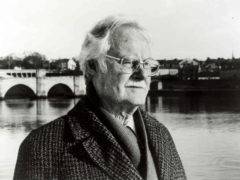
Fifty six years after the appearance of David Lean’s The Bridge on the River Kwai, Australian director Jonathan Teplitzky serves up a movie remarkably like it with respect to theme, content, spirit and locale.
The Railway Man, screened at the Toronto International Film Festival last month, is based on a true story by Eric Lomax, a British soldier who endured three years of hellish captivity in a Japanese prisoner-of-war labor camp in Thailand.
Lomax and his fellow soldiers, captured by the Japanese after the fall of Singapore in February 1942, were sent to this inferno to build a railroad from Thailand to Burma, a stretch of inhospitable terrain barely fit for human habitation.
The opening scenes of The Railway Man unfold in Britain, circa 1960, as Lomax (Colin Firth) boards a train. Fussy and professorial, he’s a railway “enthusiast” who loves trains and can effortlessly recite railway time tables. The lovely lady sitting in the compartment directly across from him, Patti (Nicole Kidman), is impressed by his knowledge and smitten by his old-fashioned demeanor and eccentric personality.
As in the fabled early 1950s British film, Brief Encounter, they are strangers on a train who seem destined never to meet again. But in a departure from that theme, they run into each other again on a railroad platform in another city, taking the first steps to consummate a budding relationship.
After their marriage, Patti discovers that Lomax is tormented by nightmares and hobbled by dysfunctional behavior, both of which he refuses to discuss. As their marriage totters on the precipice, Patti finally persuades one of his comrade-in-arms, Finlay ( Stellan Skarsgard), to fill her in on his war record. “My husband isn’t coping,” she says. “He’s a mess.”
From that point onward, The Railway Man oscillates between the present and the past, focusing on Lomax’s struggle to live normally and on the demons he cannot excise.
The traumas he carries can be traced back to a makeshift camp in the jungle, where a Japanese commander curtly informs him and his fellow Brits that their survival is dependent on fully obeying orders.
Cowed by the crushing dimensions of their fate, they comply, toiling long hours in demeaning conditions. Predictably enough, the Brits incur the wrath of their captors by building a radio from spare parts that the Japanese discover. Proceeding on the false assumption that they have used it to communicate with the “enemy,” the Japanese subject them to hideous torture, including water boarding.

Lomax stands up to the beatings heroically, developing a special hatred for Takashi Nagase (Hiroyuki Sanada). the Japanese interpreter who watches as he is tortured.
Years later, Finlay finds out that Nagase is alive and working as a tour guide in the camp where they were once held. He convinces Lomax to exact vigilante vengeance, but when Lomax finally meets his former tormentor, in a scene partially marred by theatricality, he cannot summon up the strength to kill Nagase, who since the war has commited himself to a life of reconciliation and peace.
Ably directed by Teplitzky and adapted from the late Lomax’s memoirs, The Railway Man is laced with interlocking themes. It’s about the struggle for survival in a harsh and unforgiving milieu, the brutalitythat human beings are capable of, the intoxicating allure of love when least expected, and the heady promise of redemption.
The cast could not be better.
Firth, who won an Academy Award for his role in The King’s Speech, exudes gravitas. Jeremy Irvine, who portrays the imprisoned Lomax, is strong and resolute. Kidman, her piercing cold blue eyes set off by a stylish bob cut and a dainty upturned nose, is the personification of feminine beauty and spousal dedication. Sanada projects an amalgam of cruelty and compassion.
The Railway Man does not approach the epic heights of The Bridge on the River Kwai, but its deeply-felt emotions seem genuine
